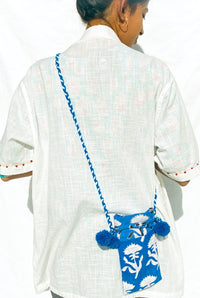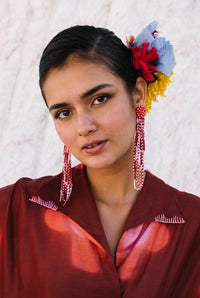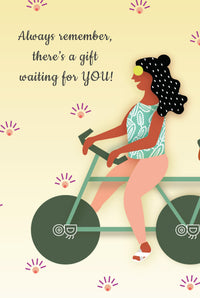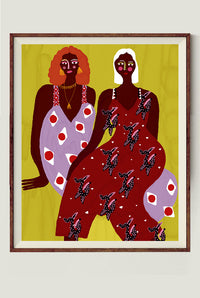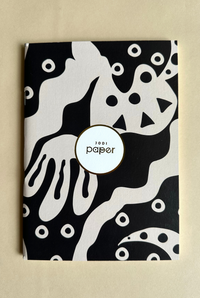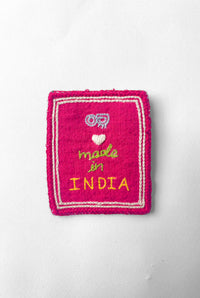Iva & New York : A love story

A notification pops up in my DMs one day, three years ago. It’s a message from Iva Dixit, a girl I’ve been following since my time at ELLE. When I started out as an intern at the magazine I heard her name often. Always casually dropped into conversations as one of their best interns. Intimidated by the ghost of this girl who seemed to be able to do anything—writing, styling, sourcing, PR—I shyly followed her on Instagram. Which is our generation's way of being expressive and casually hinting that, ‘Hey I want to be friends’.
Rarely do those DMs turn into true connections. So to receive any message, let alone a (really)nice one, was a happy introduction.
Over the years both Karuna and I have enjoyed following her work and writing. It’s brought us infinite giggles and a real sense of who she is. Open, unafraid, engaging and so incredibly relatable.
So it was a delight to be able to work with her for this feature. Ten years previously both Karuna and I had spoken and worked with Iva via email, but this was the first time we were having an actual face to face conversation. And even though it was across continents, computer screens and time zones, it felt like a meeting with your childhood pen pal.


Iva is wearing the Quasimodo mini dress.
How did you make writing your career?
I always knew I wanted to do something that allowed me to read and write professionally, (mainly because they are the only two skills I possess), but I had not a single clue as to what that work or even that world looked like. After high school, I fought with my parents and refused to go to law school and instead chose to study English literature at Lady Shri Ram College for Women (as my father likes to say, I’m allergic to making money). In 2011, I unthinkingly applied for an internship at ELLE that I had seen listed on Facebook, and to my unimaginable shock, someone actually wrote back, first asking me to do an edit test and then to come into the office to talk. On the day of my interview, I remember that Nonita Kalra, the Magazine’s then Editor-in-Chief happened to be visiting ELLE’s Delhi office and she came out to talk to me for a bit, and somehow, just somehow, even though I was frozen with nervousness throughout, I knew that I’d get it. And I did. And not to be dramatic but it truly did change my life.
For me, working at the magazine was a huge education in so many ways. But it was also the first time that I felt what it was like to be seen as a person — a real person who had some capability that wasn’t just how much I had scored on my ISC algebra pre-boards (which was usually around 4/100, FYI), on which I’d been told my entire value as a person was dependent. From sourcing to pickups, production to team management — all kinds of jobs were thrown at me (a person who had had negligible exposure to the real world) and I had no option other than having to figure things out by myself. What is a packing slip? Which designer needs someone to go pick up the samples? Do we have this or that movie star’s latest up-to-date measurements for the shoot or not? And when the movie star suddenly decides they want snacks on set? It’s my job to procure said snacks while also making sure they get changed and the shoot proceeds on time.
I remember being both exhilarated and terrified and so, so afraid to mess up. And of course, I did mess up, several times. And was forgiven for it and learned not to mess up again. But every single thing I did in those months and years that I worked for ELLE have helped me become an actual adult in ways that I am, till today, extremely grateful for.
Iva through her time at Elle, India.
Can you tell us a bit about your journey before you arrived at your current job as Staff Editor at The New York Times?
I came to the States in 2013 to go to graduate school at the Columbia Journalism School. After that I did whichever part-time internships I could find, to make money and pay my rent and be able to eat. In 2015, I was lucky enough to land my first full-time job at Newsweek magazine, which was looking for a digital editor at the time. I was 23 years old, did not know my ass from my elbow, but I did know how the Internet worked. All the things that tired a room full of very senior people in the business, who didn’t want to have to deal with things like web traffic, social and audience, I said I’ll happily take charge of them for you. A year after that, I got hired at The New Yorker in the summer of 2016, where I worked for two extremely packed years (which are now a complete blur in my mind). And then in 2018 I joined The New York Times Magazine.
We love the humour with which you approach some very personal topics – whether it’s dealing with acne or your love for raw onions. Why is that so important?
Humour is both a coping mechanism and a means through which you can try to excavate your own memories (which are often lying to you!) and I find that making fun of myself from a distance allows me to possess a healthy skepticism towards my own self-seriousness. If I can’t find the hilarity in my face sprouting up like a mushroom farm, then I can't write about the ways in which I moved through the world in that period with any amount of honesty. Grudges, hurts, bitternesses, ugliness, love, revulsion, infatuation — what better way to interrogate some of the confusing things that our minds insist on holding onto, than with the distrust that emerges from seeing them for their sheer absurdity?

Iva is wearing the Cyclops wrap dress.
Do you ever feel sceptical or worry about letting it all out there?
I like to think that I am the primary consumer for the things that I write. I’m mostly just trying to entertain myself, and as long as I can do that, I am happy. Perhaps I should worry more? But honestly, I try to not overthink it. If I’m writing about my acne-riddled face, it would be deeply dishonest of me to write that looking like a peeling lizard didn’t impact how I saw myself at that phase in my life. It’s not a judgment on me, it’s more of an indictment of the things that we think we should value about ourselves. And while nothing about me is special or exceptional, I do think that there is a certain kind of comedy inherent in the everyday ludicrousness of an ordinary lived life, like sharing an elevator in the Condé Nast building with Anna Wintour, while I’ve got strips of skin hanging off my nose and chin.
As a digital editor, what's your relationship with the internet like?
Much to the detriment of many, many other aspects of myself, I will confess that I am one of those extremely online people. See, when the rest of the world was undergoing their MySpace and Yahoo Messenger era, I was still writing letters and posting them from the all-girls boarding school I was in, where Internet access was strictly forbidden. I didn’t actually develop any sort of relationship with being online until much later in life, so in my case, this extreme-onlineness has actually been rather liberating in certain ways. As someone who only knows one mode of consumption, through hyperfixation and constant awareness, the internet codependency I have now is actually a boon given the nature of my job. Aftering years of being reticent and withdrawn amongst strangers, no one was more shocked than me to find out that actually, I am kind of a belligerent loudmouth. But a fun one, at least.
Where is home for you?
So there is a line in Amitav Ghosh’s The Hungry Tide, which goes “Where else could you belong, except in the place you refused to leave.” And as profoundly corny as it feels to vocalise it, I feel like this city is my home, simply because in the 9 years I’ve lived here, the possibility of living elsewhere has never even occurred to me. This is the first place where, even with no kitchen and no money, I felt some semblance that my life was finally mine, that the person I am becoming finally belongs to me and that I have had some hand in shaping her. Here, I have complete ownership of my life in a way that I didn’t ever think would be possible, given the world where I come from. Now, my life brooks no interference from anyone. I answer to no one else. Which perhaps may sound like a lonely way of living, but to me, that independence is a form of safety and stability that matters the most, and I don’t think I can recreate that elsewhere. 
 Iva is wearing the Tea rose maxi dress.
Iva is wearing the Tea rose maxi dress.
Has being an immigrant and a person of colour ever affected your job?
I cannot in all honesty ascribe both those terms to myself, mainly because the way they’re used now as a shorthand for marginalization feels inaccurate, especially so in my case. I had the means to navigate this country’s deeply complex immigration system, and I am not a disadvantaged person by any means, even if on a technicality, I am an outsider. And while it’s true that this country does remind you at every step of that status, which I think has impacted the psyches of different generations of immigrants differently, I’ve always known I was, am and will continue to be one. In my early years my goal was only to meet the bare minimum; have food to eat, be able to pay rent and keep a job. When your priorities are that basic, you don’t have time to sit and obsess about whether you belong here or not. It took me a long time to realise that oh wait, certain kinds of people might have been treating me differently because of my heavily Bihari-accented English or my non-American citizenship. But it’s nothing I can’t withstand.
Which is your favourite neighbourhood in New York?
Both the neighborhoods that I’ve lived in are deeply, deeply special to me. I spent five years in Central Harlem, in a basement apartment that was barely an apartment, but I was ten minutes away from this gorgeously constructed indoor pool that was open year-round, Marcus Samuelsson’s restaurant, Red Rooster, the Schomburg Center and surrounded by just the loveliest historical architecture. And then just before the pandemic, my cats and I moved into a neighborhood called Sunset Park in South Brooklyn. It's not the New York that you’ll see on TV or in the movies (unless of course I make one). Gentrification and highrises haven’t come for it yet, so it’s mostly just immigrant families and feels a lot like suburbia. A lot of people don’t know this, but the actual Sunset Park is where you’ll get the best view of Manhattan. And it has some of the best Chinese and Mexican food that you can find across all boroughs. We actually stopped to have tacos in the middle of our Jodi shoot and then somehow still managed to take the rest of the pictures despite having eaten ourselves uncomfortably full.
That takes us to our next question. What are your top places to eat in New York?
When something good happens to me, or for that matter even something bad, I go to Cafe Altro Paradiso, which looks fancy and is fancy, but the food is incredible yet so deceptively simple. They’re known for their god-tier finocchio and their spaghetti pomodoro, which you have to know to ask for, since it is not on the menu. (A very good move to impress all your dates is to take them here, order the off-menu pasta with and then watch their face contort in ecstasy when they taste it for the first time. Try it. Trust me.).
Then there’s this tiny hole-in-the-wall spot on the Lower East Side called Veeray Da Dhaba that serves pure Delhi desi khaana. They’ll even make me Gobi Manchurian if I ask for it and more importantly, I don’t have to ask for raw onions and hara mircha on the side. They’ll always know to bring it out for me.
And Tortas Morelos in Bay Ridge, which does magical things with a torta (a Central Mexican sandwich) that I didn’t think were possible. Their tecolota torta is like someone went deep into the recesses of the undeveloped parts of my lizard brain and made a sandwich that is both an abomination and a glory: old tortilla chips soaked in a spicy green or red sauce dumped with sour cream and cheese and shoved in the middle of a bread roll. This sandwich is proof that there is a god and that god gave us free will so we could do things such as shove sauce-soaked chips in between bread. 
Iva is wearing the Chaandani organza silk sari.
We’re big readers at Jodi. What books would you say have stayed with you?
So many novels have been instrumental in shaping who I am as a reader and the kind of writer that I want to be. These are the ones which I read, repeatedly and gift copies of to others and force my friends to read them: Two Serious Ladies by Jane Bowles, The Best of Everything by Rona Jaffe, Hotel du Lac by Anita Brookner and Brother of the More Famous Jack by Barbara Trapido. The Posthumous Memoirs of Brás Cubas by Joaquim Maria Machado de Assis. Annie Ernaux’s Exteriors and A Simple Passion. Everything that Lyudmila Petrushevskaya has ever written, but Immortal Love and There Once Lived a Girl Who Seduced Her Sister's Husband, and He Hanged Himself are my favorites. I gravitate very specifically, towards fiction written about unpleasant, self-destructive women making life harder for themselves and everyone around them, and novels that can make art out of the everyday cruelties that we inflict on other people. This is juvenile, but I also remember reading The Buddha of Suburbia by Hanif Kureshi in college for the first time and it just completely altered my conception of what novels could be and what they could do.
What does a perfect Sunday look like?
Doing nothing that can be qualified as even mildly productive. Sleeping till noon (or ideally even later than that). Waking up and then going for a long swim by myself. Eating an ice cream on my way back; not a fancy one, the sugary $2 Good Humor strawberry shortcake bar that tastes like chemicals. Reading on the hour-long subway ride that it takes to get to the pool and back home. And then coming back and spending the rest of the day with my four cats sleeping next to me.
Photographer : Sambit Biswas

